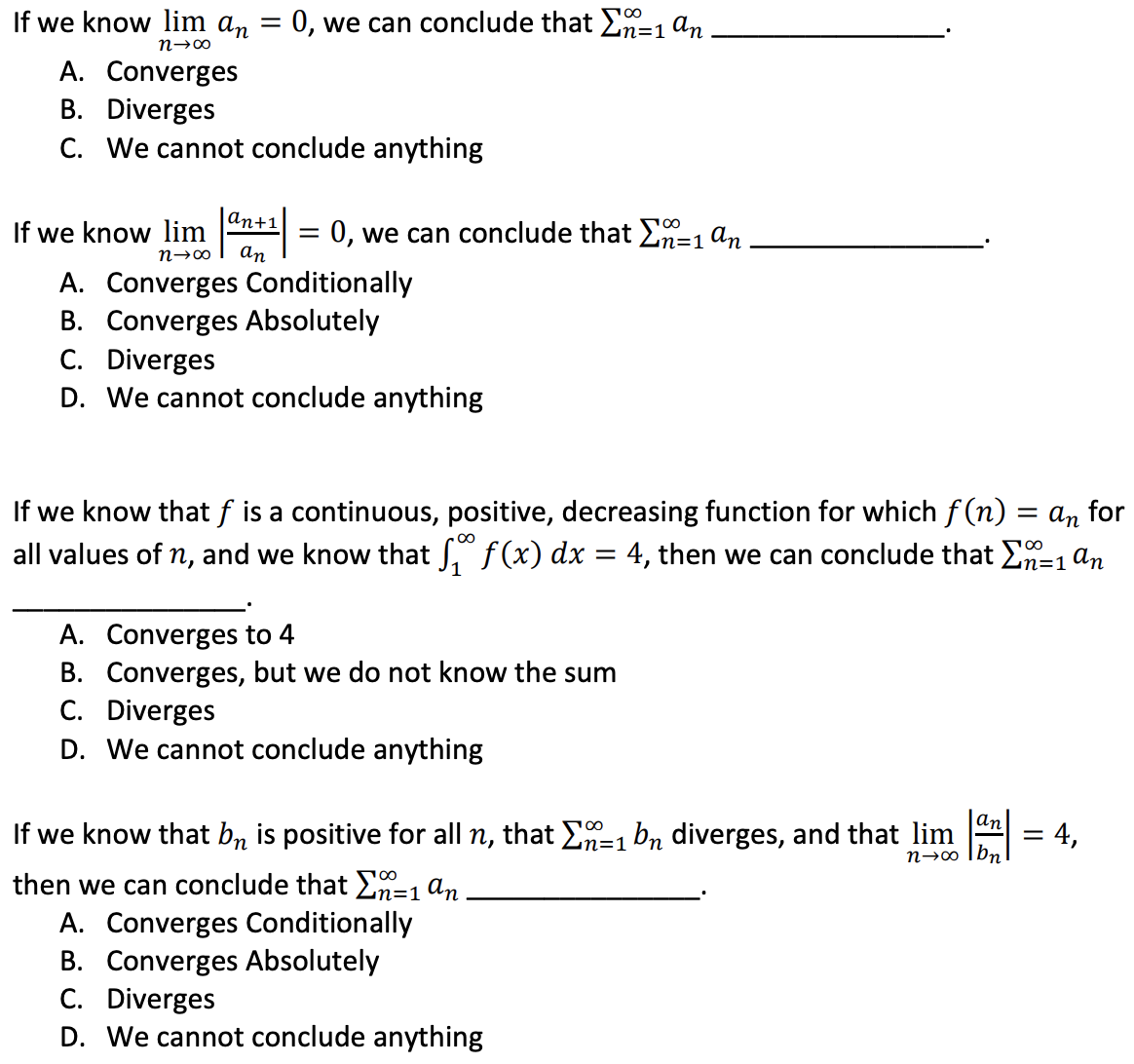If we know lim an = 0, we can conclude that Ln=1 an n→∞ A. Converges B. Diverges C. We cannot conclude anything |an+1 If we know lim an = 0, we can conclude that E=1 an A. Converges Conditionally B. Converges Absolutely C. Diverges D. We cannot conclude anything If we know thatf is a continuous, positive, decreasing function for which f (n) = an fo all values of n, and we know that f(x) dx = 4, then we can conclude that En=1an A. Converges to 4 B. Converges, but we do not know the sum C. Diverges D. We cannot conclude anything If we know that bn is positive for all n, that En=1 bn diverges, and that lim n→∞ Tbn : 4, then we can conclude that En=1an A. Converges Conditionally B. Converges Absolutely C. Diverges D. We cannot conclude anything
If we know lim an = 0, we can conclude that Ln=1 an n→∞ A. Converges B. Diverges C. We cannot conclude anything |an+1 If we know lim an = 0, we can conclude that E=1 an A. Converges Conditionally B. Converges Absolutely C. Diverges D. We cannot conclude anything If we know thatf is a continuous, positive, decreasing function for which f (n) = an fo all values of n, and we know that f(x) dx = 4, then we can conclude that En=1an A. Converges to 4 B. Converges, but we do not know the sum C. Diverges D. We cannot conclude anything If we know that bn is positive for all n, that En=1 bn diverges, and that lim n→∞ Tbn : 4, then we can conclude that En=1an A. Converges Conditionally B. Converges Absolutely C. Diverges D. We cannot conclude anything
Algebra & Trigonometry with Analytic Geometry
13th Edition
ISBN:9781133382119
Author:Swokowski
Publisher:Swokowski
Chapter5: Inverse, Exponential, And Logarithmic Functions
Section5.6: Exponential And Logarithmic Equations
Problem 64E
Related questions
Question

Transcribed Image Text:If we know lim an = 0, we can conclude that Ln=1 an
n→∞
A. Converges
B. Diverges
C. We cannot conclude anything
|an+1
If we know lim
an
= 0, we can conclude that E=1 an
A. Converges Conditionally
B. Converges Absolutely
C. Diverges
D. We cannot conclude anything
If we know thatf is a continuous, positive, decreasing function for which f (n) = an fo
all values of n, and we know that f(x) dx = 4, then we can conclude that En=1an
A. Converges to 4
B. Converges, but we do not know the sum
C. Diverges
D. We cannot conclude anything
If we know that bn is positive for all n, that En=1 bn diverges, and that lim
n→∞ Tbn
: 4,
then we can conclude that En=1an
A. Converges Conditionally
B. Converges Absolutely
C. Diverges
D. We cannot conclude anything
Expert Solution
This question has been solved!
Explore an expertly crafted, step-by-step solution for a thorough understanding of key concepts.
This is a popular solution!
Trending now
This is a popular solution!
Step by step
Solved in 4 steps with 4 images

Knowledge Booster
Learn more about
Need a deep-dive on the concept behind this application? Look no further. Learn more about this topic, advanced-math and related others by exploring similar questions and additional content below.Recommended textbooks for you

Algebra & Trigonometry with Analytic Geometry
Algebra
ISBN:
9781133382119
Author:
Swokowski
Publisher:
Cengage

Functions and Change: A Modeling Approach to Coll…
Algebra
ISBN:
9781337111348
Author:
Bruce Crauder, Benny Evans, Alan Noell
Publisher:
Cengage Learning

Algebra & Trigonometry with Analytic Geometry
Algebra
ISBN:
9781133382119
Author:
Swokowski
Publisher:
Cengage

Functions and Change: A Modeling Approach to Coll…
Algebra
ISBN:
9781337111348
Author:
Bruce Crauder, Benny Evans, Alan Noell
Publisher:
Cengage Learning